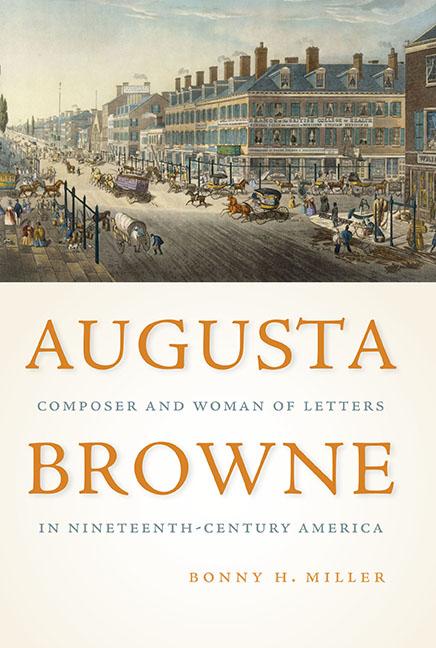Book contents
- Frontmatter
- Contents
- List of Illustrations
- Preface
- Acknowledgments
- Introduction
- 1 First Steps
- 2 Apprentice in a Family Music Business
- 3 Philadelphia Debut
- 4 A Young Professor of Music
- 5 A New Leaf
- 6 Her Own Woman
- 7 Courtship and Consequences
- 8 Pilgrim in Progress
- 9 “Glad Fruition”
- 10 Legacy in Music
- 11 Legacy in Literature
- 12 Contributions to Music Journalism
- 13 A Legacy Written into History
- Appendixes
- Appendixe 1 Children and Descendants of David Samuel Browne and Elizabeth Montgomery Browne
- Appendixe 2 Chronology of Augusta Browne’s Music and Letters
- Appendixe 3 List of Musical Works
- Appendix 4 Selected Glossary
- List of Abbreviations
- Notes
- Selected Bibliography
- Index
2 - Apprentice in a Family Music Business
Published online by Cambridge University Press: 23 October 2020
- Frontmatter
- Contents
- List of Illustrations
- Preface
- Acknowledgments
- Introduction
- 1 First Steps
- 2 Apprentice in a Family Music Business
- 3 Philadelphia Debut
- 4 A Young Professor of Music
- 5 A New Leaf
- 6 Her Own Woman
- 7 Courtship and Consequences
- 8 Pilgrim in Progress
- 9 “Glad Fruition”
- 10 Legacy in Music
- 11 Legacy in Literature
- 12 Contributions to Music Journalism
- 13 A Legacy Written into History
- Appendixes
- Appendixe 1 Children and Descendants of David Samuel Browne and Elizabeth Montgomery Browne
- Appendixe 2 Chronology of Augusta Browne’s Music and Letters
- Appendixe 3 List of Musical Works
- Appendix 4 Selected Glossary
- List of Abbreviations
- Notes
- Selected Bibliography
- Index
Summary
In June 1826 David Browne finally achieved his goal of establishing a music academy in the United States. The family arrived in Boston by ship from St. John no more than a month prior to the vibrant Fourth of July festivities. The new nation—and especially the proud city of Boston—exploded with jubilation on the Fourth in 1826, as it celebrated the fiftieth anniversary of the Declaration of Independence. Despite being in the city only a few weeks, Augusta's enterprising father reached out to other military bandsmen and persuaded Mr. Kendall's Brigade Band to perform his American Grand March in the Fourth of July procession.
John Quincy Adams was the US president, following a rancorous election in which Andrew Jackson won a plurality—but not a majority—of both the popular and the electoral count. After the vote was decided against him in the House of Representatives, Jackson vowed to sweep the election in 1828 and usher in an era of democracy by majority rule in which ordinary men would hold as much power as those with privileged backgrounds. In a stunning coincidence, that brilliant Fourth of July in 1826 was marked by the deaths of the sages of the early Republic, John Adams and Thomas Jefferson, as though one tide was going out and another was coming in. It was also the birth date of the iconic American songwriter Stephen Foster.
The impressive domed Massachusetts State House held pride of place in Boston above the Common on Beacon Hill, alongside the elegant homes of the foremost families. Just to the east, State Street housed bank after bank, import houses, and offices of the insurance companies that protected importers against the devastation of all too common warehouse fires or the loss of ships at sea. Washington Street was the business thoroughfare and “neck” that connected the city center with the higher land west of town (fig. 2.1). Newspapers brimmed with colorful descriptions of merchandise, foods, and luxury items offered for sale by the shops along Washington Street.
- Type
- Chapter
- Information
- Augusta BrowneComposer and Woman of Letters in Nineteenth-Century America, pp. 27 - 45Publisher: Boydell & BrewerPrint publication year: 2020

